Delrey Metals Corp.’s (CSE:DLRY, FSE:1OZ) mandate is to create shareholder value by sourcing, financing & developing undervalued strategic energy metals properties & projects through staking ground or making accretive, prudently and creatively financed acquisitions & joint ventures / farm-ins. They’re off to a good start and have a clean balance sheet with just 34 million shares outstanding and cash of ~C$ 1.5 million. The market cap is about C$8 M = US$6.1 M. The Company is aggressively pursuing additional strategic energy metals assets, and have honed in on 2 or 3 in particular.
Delrey Metals has acquired 5 highly prospective properties in Canada. 4 are prospective for vanadium, for a total of 9,482 hectares, and 1 is a cobalt–copper-zinc opportunity that Cobalt 27 Capital Corp. acquired a 2% NSR on. All 4 vanadium assets will be receiving airborne magnetic surveys and geophysics in February. Subject to results, management will determine which properties to focus on. Both the Porcher and Blackie properties have unique features that if confirmed, will likely make them top priority targets for the next phase of exploration.
Early Days for the Canadian Vanadium Opportunity
Interest in vanadium has grown along with the price. Demand from China continues to be the key driver. While the rest of the world grows at 2%-3% per year, a bad year for China is +6%, and its the 2nd largest economy on the planet. Not only does China use a tremendous amount of steel, it uses huge quantities or rebar which is used in construction & infrastructure building (and rebuilding).
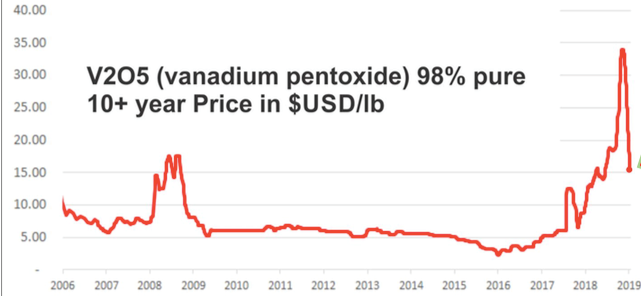
Regarding vanadium pentoxide pricing, there’s been a lot of angst over the recent dramatic decline, but Chinese prices seem to be settling in around US$17/lb. The chart above shows a price closer to US$15/lb., but the price was US$16.90/lb. as of February 3rd. It topped out at nearly US$35/lb. in November, so the price has been halved from a 13-yr. high. Importantly, US$17/lb. is still a strong price, up from a low of US$2.35/lb. on 12/31/15. From $2.35/lb., the Chinese vanadium pentoxide price has risen at a 3-yr CAGR of ~93%. A price between US$15-US$25 is a sweet spot, too high a price and VRBs get priced out of the market.
Perfect Storm of Demand & Supply Fundamentals
Vanadium is primarily used (91%) to strengthen steel rebar, (2 pounds of vanadium added to a tonne of steel doubles its strength), last year China came out with new regulations for Chinese rebar makers– use more vanadium! However, reportedly, 30%-40% of Chinese rebar producers did not follow the regulation implemented in November, which was likely a big factor in the vanadium price crash. The increased demand from this initiative alone is estimated at 10,000 tonnes per year. That’s on a global market of about 90,000 tonnes. 10,000 tonnes/yr. is what Largo Resources’ main mine in Brazil produces, one of the largest mines in the world.
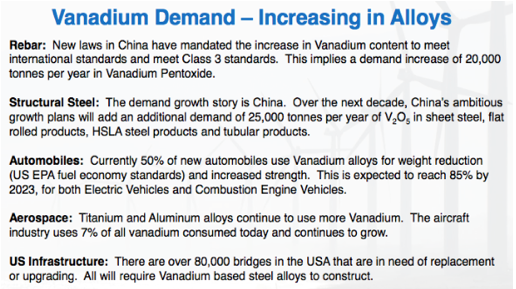
Global demand for vanadium is also being enhanced by other internal moves in China, most notably a total ban on the import of slag and scrap (waste products) that contain vanadium. These waste streams had been used as feedstock for vanadium producers in China. The ban is expected to reduce domestic Chinese production by ~5,000 tonnes/yr.
Quickly on the supply side there have been mine closures dating back to 2015 that are impacting the market. In 2015 a major Brazilian company liquidated, closing the Evraz Highveld mine, representing 10%-15% of global vanadium production. However, at the time the inventory of vanadium was high, so there was a limited price reaction.
Fast forward 2-3 years, there have been other smaller mine closures in China & Brazil, and the above mentioned increase in demand, causing vanadium inventory to be drawn down substantially. Therefore, both sustained demand drivers and ongoing supply constraints help explain the price move from $2.35/lb. at the end of 2015 to a peak of nearly US$35/lb. in 4th qtr. 2018.
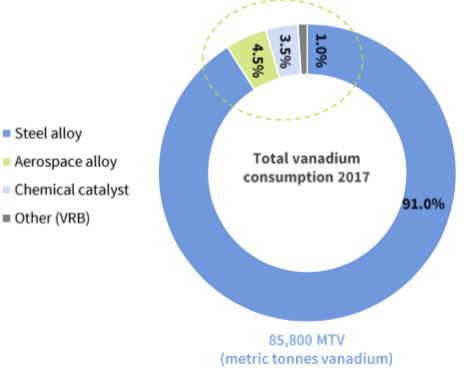
Vanadium Reflux Flow Batteries Could use 31k tonnes of V2O5 by 2025
And then there’s Vanadium Reflux Flow Batteries (“VRBs“). They represent just ~1.5% of the global vanadium market, but some pundits have large, grid-scale energy storage growing at a CAGR of up to 40%. Roskill forecasts vanadium use in VRBs to be 31,000 tonnes by 2025. If true, VRB’s would be a significant demand driver, easily overtaking the uses in Aerospace & chemical catalysts combined.
2019 could be a sweet spot in vanadium pricing, several experts expect prices in the US$15/lb. to US$25/lb. range. That would sustain bullish sentiment for companies with properties outside of China, Russia & South Africa. Delrey Metals has exactly that, 5 early-stage prospects in Canada, all with decent infrastructure, all situated on past producing mining or logging sites, and most important, all having had historical work. Prior work included magnetic and other surveys, soil sampling, surface samples, concentrates were made from some samples, and a drill program (at the Star property).
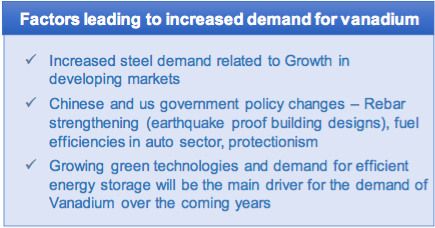
Blackie Vanadium Property
The Blackie Vanadium property is in west-central British Columbia,, ~96 km south-southwest from Prince Rupert. The property is on Banks Island and is accessible year-round. It is located on tidewater, accessible to the Prince Rupert deep water port, which allows for an 8 day trip to North American west coast ports. There’s a network of logging roads (<500 meters away) allowing for low-cost exploration & development.
The property consists of 5 tenures covering 1,213 Hectares, open for expansion in multiple directions. Blackie is on a brownfield site, the Yellow Giant underground mine was operational as recently as 2015. Blackie is host to a gabbroic body 1.2 km by 0.4 km, with an estimated thickness of at least 500 m (McDougall, 1985).
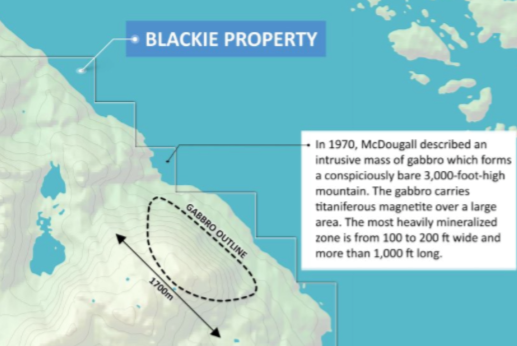
Assays from samples collected by McDougall (1984) ranged from 20% to 25% Iron, 1.1% to 1.9% Titanium, and up to 0.33% V (0.59% V205). Concentrate results made from these samples returned 0.5% to 1% V (0.89% to 1.78% V205). Individual outcrop results from a previous operator returned up to 49% Iron, 7.0% Titanium and an extremely anomalous 1.2% V (2.14% V2O5). “Several million tons of Iron-Titanium-Vanadium bearing material are known at this locality” 1(Rose and Mulligan, 1970).
The Porcher property
The Porcher property is located in west-central BC, ~38 km south-southwest from Prince Rupert. The property is located on Porcher Island and is accessible year-round. There’s a network of nearby logging roads, allowing for cost-effective exploration & development.
Porcher consists of 7 tenures covering 3,122 Hectares, open for expansion in multiple directions. The property is located in a past-producing mining district. The Surf Point Mine, located ~9 km from the Porcher property, operated from 1919 through to 1939. Like with the Blackie property, Porcher is located on tidewater, less than 39 km from Prince Rupert’s deep water port.
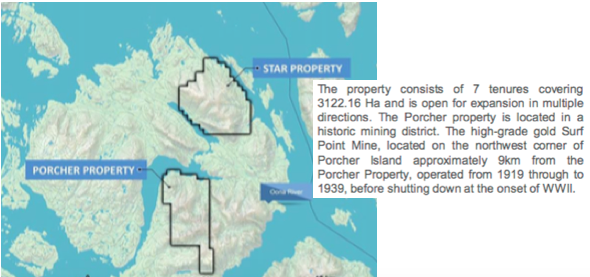
Porcher is host to 2 gabbroic dykes hosting iron-titanium-vanadium mineralization. These sizable dykes are 5.2 km x 1 km, and 4 km x 0.6 km. The dykes are coincident with a large magnetic anomaly identified in the Canada 200 m Residual Total Magnetic field dataset. Limited sampling by McDougall (1961) was completed, with concentrate results ranging from 0.3% to 1.5% Titanium and 0.2% to 0.5% V (0.34% to 0.84% V205). V2O5 deposits globally range from about 0.3% to 0.7%.
Peneece Vanadium Property
The Peneece Vanadium property is in southwest BC, a narrow coastal mainland fjord 85 km east of Vancouver Island. The property consists of 5 tenures covering 1,500 Hectares, open for expansion in multiple directions. Peneece is located along tidewater and is accessible year-round. There’s a network of logging roads within the center of the project area.
The property is host to a >4.8 km long by 0.8 km wide (open to the northwest) pyritic gabbroic complex associated with a very large and intense magnetic anomaly which is believed to be caused by a large body of vanadium-bearing massive titaniferous magnetite.
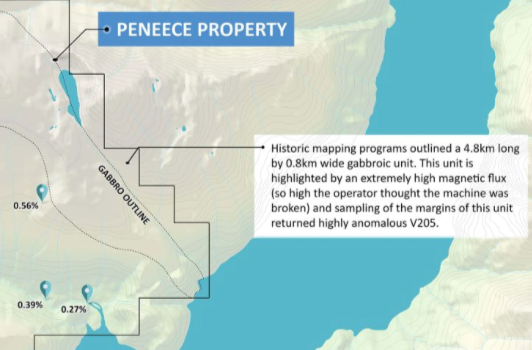
Access problems prevented sampling of the highly magnetic core, and only marginal material samples were obtained. Concentrate results from these samples graded 0.16% to 0.33% V (0.29% to 0.59% V205 – AR 12204) and up to 6.5g/t Ag, a precious metal not typically found in these systems.
The Star Property
The Star property is located in west-central BC, ~ 27 km south-southwest from Prince Rupert. Like the Porcher property, Star is situated on Porcher Island and is accessible year-round. There’s a network of logging roads covering the majority of the property.
Star consists of 4 tenures covering 3,647 Hectares, open for expansion in multiple directions. The Star property is in the same historic mining district as the Porcher property. A gold mine operated from 1919 to 1939. It is located 10 km from the Star property.
The eastern part of the property was explored and drilled in 1955 for Iron Ore by One Resources Canada Corp. Twelve short (<50 m) diamond drill holes were completed for a total of 696 m, targeting a small magnetic anomaly. Conclusions from this work program were that ‘at least several hundred thousand tonnes of magnetite-bearing rock with a grade of the order of 35% Iron exist within the drilling area’ (PF671671).
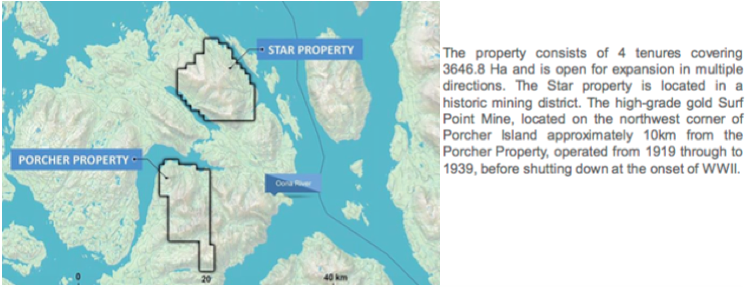
The One Resources Canada Corp. 200m Residual Total Magnetic field dataset highlights a large 5 km x 7 km magnetic high located in the center of the Star claim group. Historic drilling indicated a much larger resource potentially exists within the property area to the west. While the historic drill program did not analyze the magnetite for Vanadium, a Regional Geochemical Survey (RGS) was completed by the British Columbia Geological Survey in 2000 over the Star claim group, which highlighted up to 148 ppm vanadium-in-silt (99th percentile) and 5.06% Iron.
Management believes the Star property has the makings of a significant vanadium discovery including a large magnetic (5km x 7km) high, drained by extremely anomalous vanadium-in-stream results, with a several hundred-thousand-tonne magnetite resource on the margin.
The Sunset Property
The Sunset Property consists of 4 mineral titles covering 785 Hectares. The area had exploration work done in the 1970’s-1980’s. Several cobalt-copper-zinc soil geochemistry anomalies were discovered. In 1987, Decade International outlined a large cobalt‐copper‐zinc anomaly.
A recent exploration program consisting of mapping, grid preparation, geochemical soil sampling & magnetometer surveys has been done, validating the previous cobalt‐copper-zinc soil geochemical anomaly. Copper values in soil over 500 ppm, when plotted with historical values, indicate a cluster about 1,000 meters by 500 meters. Numerous anomalous Cobalt values lie within this area and a smaller cluster of anomalous zinc in soil is also present.
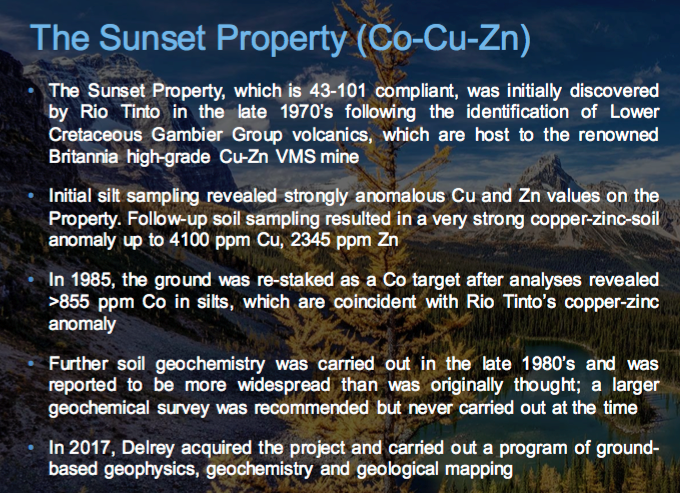
The presence of elevated levels of Cobalt is interesting, and a 2% NSR royalty on Cobalt only has been sold to Cobalt 27 Capital Corp.
Delrey Metals recently finished a phase one exploration program at Sunset. In September 2018, the Company collected 708 soil samples, 68 rock samples and 11 stream sediment samples. As a result of the sampling, management extended its cobalt-copper-zinc anomaly about a kilometre to the west, and discovered a new zone, called Roughrider, which graded up to 4.3% copper. Management believes the new zone may indicate a cobalt-copper-zinc VMS-style of mineralization.
With these 5 properties, investors have multiple opportunities to win if management advances any of the properties to a maiden resource or to a PEA. If one believes in the fundamentals of Vanadium, Canada is a great place to be looking for potentially economic deposits. In addition, management is actively looking at other attractive properties to acquire or option. 2019 is shaping up to be a busy and productive year for Delrey Metals (CSE:DLRY, FSE:1OZ).
Disclosures: The content of this article is for information only. Readers fully understand and agree that nothing contained herein, written by Peter Epstein of Epstein Research [ER], (together, [ER]) about Delrey Metals, including but not limited to, commentary, opinions, views, assumptions, reported facts, calculations, etc. is not to be considered implicit or explicit investment advice. Nothing co-ntained herein is a recommendation or solicitation to buy or sell any security. [ER] is not responsible under any circumstances for investment actions taken by the reader. [ER] has never been, and is not currently, a registered or licensed financial advisor or broker/dealer, investment advisor, stockbroker, trader, money manager, compliance or legal officer, and does not perform market making activities. [ER] is not directly employed by any company, group, organization, party or person. The shares of Delrey Metals are highly speculative, not suitable for all investors. Readers understand and agree that investments in small cap stocks can result in a 100% loss of invested funds. It is assumed and agreed upon by readers that they will consult with their own licensed or registered financial advisors before making any investment decisions.
At the time this article was posted, Delrey Metals was an advertiser on [ER]. Readers understand and agree that they must conduct their own due diligence above and beyond reading this article. While the author believes he’s diligent in screening out companies that, for any reasons whatsoever, are unattractive investment opportunities, he cannot guarantee that his efforts will (or have been) successful. [ER] is not responsible for any perceived, or actual, errors including, but not limited to, commentary, opinions, views, assumptions, reported facts & financial calculations, or for the completeness of this article or future content. [ER] is not expected or required to subsequently follow or cover events & news, or write about any particular company or topic. [ER] is not an expert in any company, industry sector or investment topic. [ER] may buy or sell shares in Delrey Metals and other advertising companies at any time.



 Follow us on Twitter
Follow us on Twitter Become our facebook fan
Become our facebook fan

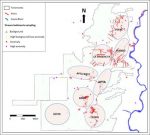








Comments are closed.